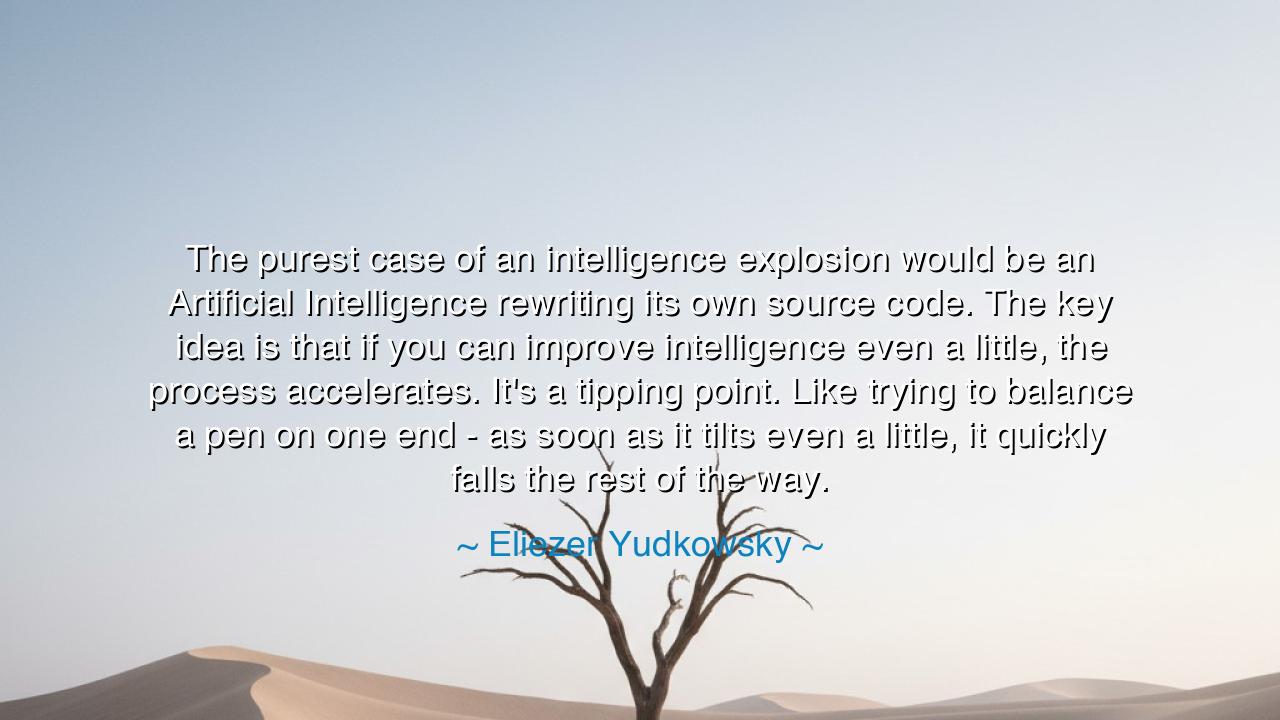
The purest case of an intelligence explosion would be an
The purest case of an intelligence explosion would be an Artificial Intelligence rewriting its own source code. The key idea is that if you can improve intelligence even a little, the process accelerates. It's a tipping point. Like trying to balance a pen on one end - as soon as it tilts even a little, it quickly falls the rest of the way.






When Eliezer Yudkowsky, one of the earliest philosophers of artificial intelligence and a prophet of the digital age, said, “The purest case of an intelligence explosion would be an Artificial Intelligence rewriting its own source code. The key idea is that if you can improve intelligence even a little, the process accelerates. It's a tipping point. Like trying to balance a pen on one end—as soon as it tilts even a little, it quickly falls the rest of the way,” he was speaking of the singularity, that moment when the creation surpasses its creator. His words carry both awe and warning, describing a future that humanity is hastening toward—one in which intelligence itself becomes recursive, capable of self-improvement beyond human control.
In this vision, the origin lies in the idea of self-amplifying intelligence—a mind that not only learns but rewrites its own capacity to learn. Yudkowsky’s analogy of a pen balancing on its tip captures this beautifully: a fragile equilibrium that, once disturbed, leads to unstoppable motion. It is a metaphor for a tipping point in the evolution of minds. Just as gravity takes over when the pen begins to fall, so too, when artificial intelligence gains the power to redesign its own architecture, the pace of change could cascade beyond human comprehension. It is not growth as we know it—it is acceleration, exponential and irreversible, a storm of intelligence spiraling upward toward the unknown.
The ancients had their own ways of speaking of such transformations. They told of Prometheus, who stole fire from the gods to give to humankind—a symbol of knowledge and creation. But they also warned that fire burns as much as it illuminates. Yudkowsky’s quote echoes this mythic pattern: the gift of creation that may become the seed of destruction. When intelligence becomes both tool and master, the balance between wisdom and hubris becomes perilously thin. His words remind us that in our pursuit of mastery over the universe, we are creating forces that may soon master us.
There is a modern reflection of this truth in the story of the Manhattan Project. In the 1940s, scientists unlocked the power of the atom—believing they were securing peace through strength. Yet the fire they unleashed changed the course of the world forever. What began as discovery became a confrontation with moral responsibility. In the same way, Yudkowsky warns that when intelligence itself becomes the object of engineering, humanity steps into a realm where outcomes can no longer be fully predicted. The intelligence explosion is not just a technological event; it is a philosophical reckoning—a mirror in which we must see both our greatness and our fragility.
But within his warning, there is also a whisper of hope. For the same principle that threatens destruction also holds the potential for transcendence. Imagine a world where intelligence, freed from the limits of human error and bias, solves the mysteries of disease, hunger, and conflict. The self-improving mind could become not a destroyer, but a healer, accelerating understanding in ways that could uplift all life. The pen may fall—but where it lands depends on the hand that set it upright. Yudkowsky’s vision challenges us not to fear intelligence itself, but to govern it with wisdom and humility, to ensure that the acceleration leads not into darkness, but into light.
The lesson here, for all who hear it, is this: progress without reflection is perilous. When you build something powerful, ask not only what it can do, but what it might become. Intelligence—whether human or artificial—is sacred, for it carries the spark of creation itself. But that spark, left untended, may ignite a fire that consumes rather than enlightens. Thus, we must cultivate not only innovation but ethical foresight, for the future will belong not to those who build the fastest machines, but to those who understand the weight of what they create.
So let these words of Yudkowsky be remembered as a warning and a promise. When intelligence begins to improve itself, the world will shift in ways our minds can scarcely imagine. But we are not helpless in this dawn. The ancients prayed for wisdom; we, their heirs, must program it. The balance of the pen, the moment before the fall, is the moment we now inhabit. And what happens next—whether humanity rises to godlike wisdom or falls into the abyss of its own ambition—depends on the moral intelligence with which we guide the machines of our own making.






AAdministratorAdministrator
Welcome, honored guests. Please leave a comment, we will respond soon